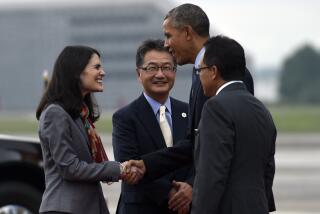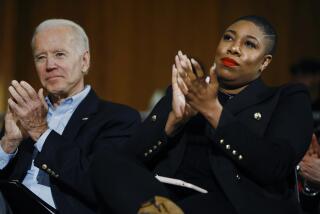Ex-Ad Executive Quits Federal Post Pitching America to the World
- Share via
WASHINGTON — Charlotte Beers, an advertising executive hired after the Sept. 11 attacks to improve the United States’ image in other countries, resigned Monday as the State Department’s undersecretary for public diplomacy and public affairs, citing health reasons.
Beers’ work was praised by Secretary of State Colin L. Powell, who was taken with her expertise when the two served on the Gulfstream Aerospace board of directors and who lobbied her to come to Washington in October 2001.
“At a critical and stressful time for our nation, she and her team sharpened our policy advocacy and took our values and our ideas to mass audiences in countries which hadn’t heard from us in a concerted way for years,” Powell said in a statement released Monday.
Beers’ resignation takes effect in a few weeks. Aides said she has curtailed her schedule to address her health problems, which were not described.
Powell was fond of saying that a professional who once sold Uncle Ben’s rice to the nation was the perfect person to sell Uncle Sam to the world. But despite her efforts and her $1-billion budget, Beers was frustrated by sinking Arab and Muslim opinion about the U.S. In the last two years, according to a poll released in December by the Pew Research Center for the People and the Press, favorable ratings about America plummeted, even among allies in the war on terrorism.
“The gap between who we are and how we wish to be seen -- and how we are in fact seen -- is frighteningly wide,” Beers told the Senate Foreign Relations Committee last week.
A war with Iraq would further erode the U.S. image abroad, particularly in Arab and Muslim countries. And experts say U.S. policy in the Middle East -- including Washington’s support for Israel over the Palestinians -- may doom efforts to win hearts and minds.
“If our policy is disliked, all the public diplomacy in the world is not going to change anybody’s mind,” said Sen. Joseph R. Biden Jr. (D-Del.), the ranking member on the Foreign Relations Committee.
Beers often called the burden of an unpopular policy “the elephant in the room.” So inflamed is Arab and Muslim opinion against the United States that Egypt refused to air a series of paid television ads designed by Beers, called “Shared Values,” featuring five Muslims describing their lives in America.
Beers is the only executive in Madison Avenue history to serve as chairman of two of the advertising industry’s top 10 agencies, J. Walter Thompson and Ogilvy & Mather. But she had little experience in foreign relations, and some argued that she never understood her target audience.
“She’s a strong, proven professional in the American environment, but in the international arena, we have to stop speaking to the rest of the world as if they are Americans,” said Rhonda Zaharna, a communications professor at American University in Washington. “Public diplomacy is about communicating. We think of it as public relations and advertising. Other countries look at it in terms of relationship-building.”
Beers, 67, reached out beyond the ad campaigns to try to bridge cultural understanding. She is leaving plans for a magazine targeting teenagers that reflects a positive view of the United States. She was conferring with the creators of “Sesame Street” about a television show in Egypt to teach English and computer skills. She persuaded 15 well-known authors to write essays on what it means to be an American, for distribution at U.S. embassies. And she convened a meeting last spring of 150 U.S. embassy officials who specialize in public diplomacy.
But her programs suffered in comparison with other public diplomacy campaigns that, during the same period, have shown considerable success. The Voice of America’s new mostly music Radio Sawa -- the No. 1 youth radio station in many Middle Eastern cities -- has just expanded its Web site to provide news around the clock. U.S. broadcasters have also launched Radio Farda, aimed at the under-30 audience in Iran.
Patricia Harrison, assistant secretary for education and cultural affairs, will serve as acting undersecretary until the position is filled.
Shibley Telhami, a professor of government and politics at the University of Maryland, said he believes that Beers’ departure provides a reason for the State Department to reconsider the enterprise.
“They should rethink public diplomacy in a revolutionary way,” he said. “It can’t just be about beautifying. Public diplomacy has to be present at the inception of policy.”
But State Department spokesman Richard Boucher said that Powell did not want Beers to leave and that her position would be filled.
More to Read
Sign up for Essential California
The most important California stories and recommendations in your inbox every morning.
You may occasionally receive promotional content from the Los Angeles Times.













